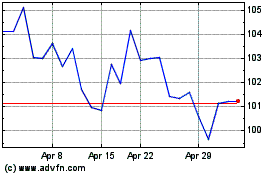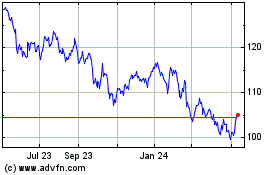Nestlé Will Miss Its Long-Term Sales Target -- WSJ
October 21 2016 - 3:02AM
Dow Jones News
By Brian Blackstone
VEVEY, Switzerland -- Nestlé SA reported subdued sales growth
and said it would fall short of a key revenue growth benchmark for
a fourth straight year, underscoring the difficult environment for
major global consumer goods companies.
The results, which were below analysts' expectations, came on
the heels of recent figures from peers such as Unilever PLC and
Danone SA that also showed slower growth.
These companies, like Nestlé, face headwinds including weaker
global growth particularly in emerging markets, volatile
currencies, changing consumer tastes and a difficulty raising
prices in an environment of low inflation or even falling prices,
known as deflation.
Vevey-based Nestlé, owner of Crunch candy bars, Puppy Chow pet
food and Nespresso coffee, said Thursday that sales for the first
nine months of the year were 65.5 billion Swiss francs ($66.2
billion), up from 64.9 billion Swiss francs a year earlier and
slightly below analysts' expectations.
Organic sales -- which strip out the effects of currency swings
and acquisitions -- rose 3.3% from the previous year. Nestlé said
it expects organic sales growth of 3.5% for 2016 as a whole, down
from its previous forecast of around 4.2%.
It would be the weakest rise in at least 20 years.
Nestlé shares fell more than 1% in early European trading but
then recovered somewhat and were just 0.3% lower late Thursday at
74.5 francs.
"The revised guidance might not be a real surprise, however,
[it] is nevertheless a negative for a stock living on a reputation
of being defensive and diversified," said analysts at Baader Helvea
Equity Research.
Failure in 2016 to achieve organic sales growth of between 5%
and 6% would mark the fourth successive year the company has missed
its long-term goal, which it refers to as the "Nestlé Model."
Still, Chief Executive Paul Bulcke said the company was sticking
with the "ambition" of 5% to 6% growth.
"I do believe that in normal conditions that 5%-6% is definitely
something we have to aspire to," Mr. Bulcke said in an interview.
"We're living in quite special conditions. Everyone has to admit
that."
He said a mix of faster global economic growth and rising prices
should create the conditions for Nestlé to reach its growth
objective again. "The atmosphere is a little bit depressed in
general and that is affecting the macroeconomics of our industry to
a certain extent," he said.
When inflation is unusually subdued, or when consumer prices
fall, consumers get a boost in the shape of higher disposable
incomes. The flip side is that companies such as Nestlé rely in
part on being able to lift their own prices to generate growth, and
when they can't, it affects revenue.
Meanwhile, Nestlé has faced problems of its own, particularly a
recall of its Maggi noodles in India last year and weakness in its
frozen foods business in the U.S. Nestlé said Thursday that its
Maggi business "continued to gain back market share and
comparatives turned favorable."
"Bulcke has been fighting fires over the last three or four
years," said Jon Cox, head of Swiss equities at Kepler Cheuvreux.
"He inherited a business that did very well up until 2012. After
2013 he has been struggling to get growth back in a much more
competitive environment."
In an effort to spur growth, the company has expanded its
nutrition-and-health-sciences business. Reflecting that emphasis,
the company in late June tapped Ulf Mark Schneider -- the former
head of German health-care company Fresenius SE -- to be its next
chief executive starting Jan. 1.
Mr. Bulcke, who has been CEO since 2008, will become Nestlé
board chairman next year.
Write to Brian Blackstone at brian.blackstone@wsj.com
(END) Dow Jones Newswires
October 21, 2016 02:47 ET (06:47 GMT)
Copyright (c) 2016 Dow Jones & Company, Inc.
Nestle (PK) (USOTC:NSRGY)
Historical Stock Chart
From Apr 2024 to May 2024

Nestle (PK) (USOTC:NSRGY)
Historical Stock Chart
From May 2023 to May 2024
